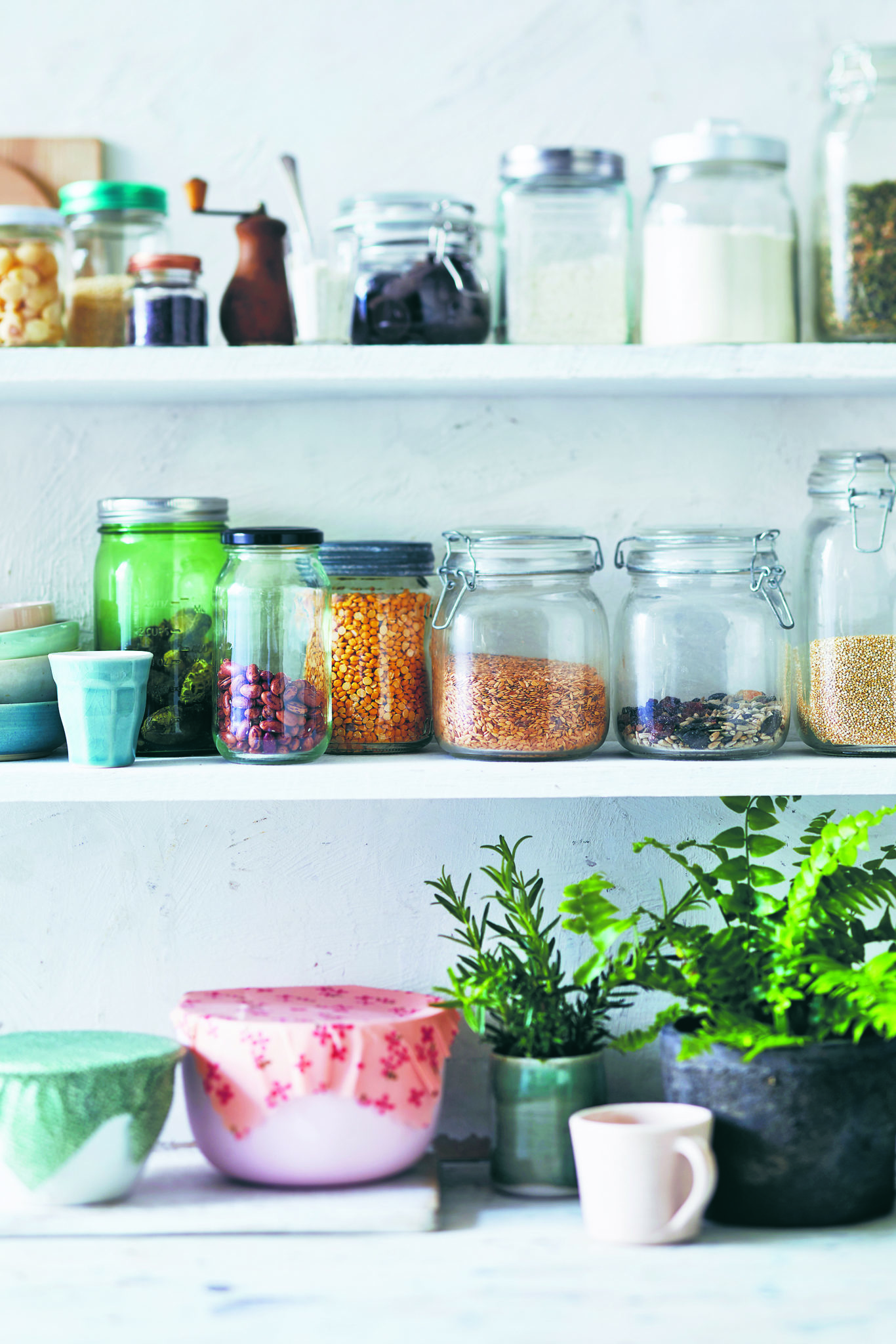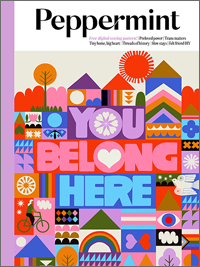
How To: Go Low-plastic
Happy Plastic Free July! In the month where we try extra hard to give plastic the heave-ho for good, we’re featuring some highly practical tips from authors who have excellent things to say on the subject. Without further ado, here’s an extract on how to kick-off a low plastic habit – taken from the awesome Low Tox Life by Alexx Stuart.
Single-use plastics and plastic in general are basically a human addiction. The average person knows that plastic is overused and wasteful, yet they just have to get that bottle of water, the takeaway coffee, the bag for their convenience.
Step one in moving forward from addictions? Admitting we have a problem. That’s exactly what I had to do to reduce my plastic use. And while I’m by no means one of those admirable zero-waste gurus whose year’s worth of plastic fits into one tiny jar, I’m a darn sight better than I used to be, saving thousands and thousands of single-use plastic items each year. Just me and my family. Care to join us and give it a red-hot go?
PLASTIC FACTS
Here are a few things about plastic to help you get motivated about ditching as much as you can from your day-to-day purchases:
✽ In 2002 alone, 5 trillion plastic bags were produced. They never fully degrade, they simply break down into microplastics, affecting wildlife and human life as we ingest them without knowing.
✽ BPA-free plastics may be even worse for you than those containing BPA, because alternatives like BPF might be even more harmful. There’s more and more evidence coming to light on this every day.
✽ Some of the chemicals in plastic have been found to be obesogenic – causing you to put on weight!
✽ Roughly 50 per cent of the world’s plastic production is used once and then thrown away. Madness!
✽ The amount of plastic produced in the past ten years is equal to the amount produced in the entire 20th century since plastic production began in the late 1940s.
✽ Throughout the world, around 1 million seabirds and 100,000 marine mammals are killed every year by plastics, either entangled and strangled or choked and starved.
REDUCING YOUR PLASTIC USE AT THE SHOPS AND AT HOME
Stop using plastic bags when shopping: This means both individual plastic bags for produce and plastic bags for carting your shopping home. There’s absolutely no need for three lemons to go into a single-use plastic bag that then gets packed into a single-use plastic bag. We only ever do what we do because we’ve been conditioned to, to the point where our brains aren’t thinking any more because they don’t believe they have to. In doing the work on why our plastic use needs to be drastically reduced, your brain will be able to create a new pathway and habit. Get some reusable shopping and produce bags.
Whatever I wanted had to fit in my hands or handbag or I’d have to leave it…
Don’t let yourself take another plastic bag. Be strict. When you unpack the shopping, immediately place the reusable bags back in front of your front door so that you remember to take them with you. When I first imposed the bag ban, that meant wrapping shopping in my gym towel, or carrying six avocados in my handbag (I’m pretty sure people thought I was a shoplifter on the way home!). Whatever I wanted had to fit in my hands or handbag or I’d have to leave it, because I was not allowed a plastic bag full stop! I was remembering those reusable bags pretty easily after a week or two!
Buying nuts, seeds and other dried goods in bulk: Rather than buy dried goods at the supermarket or (most) health food stores, buy them at a bulk-bin place or a co-op if you can join one in your area.
Stop buying ‘halves’ of fruit and veg: half a melon, pumpkin (squash), cauliflower, cabbage or papaya means plastic wrap. Buy them whole and get a little recipe inspiration to ensure you use them all up over the week. You could roast half your cauliflower with turmeric and olive oil, served with pomegranate and goat’s curd; then blitz the other half into a puree with coconut milk and sea salt. Different textures and flavours means not getting bored!
Get reusable bags for delicate produce: or make your own.
Keep herbs fresh by wrapping tightly in damp tea towels: rather than use plastic bags. Works a treat!
Ask for a box from the store room: this is the solution if you’ve forgotten your bag and you need more than you can carry. I’m waiting for the day when this stops being met with a blank stare! But truly, there’s always a box lying about in the back of a shop.
Carry your own cutlery: keep it in a pencil case in your bag for when you do food courts and touristy days in general, where you might be handed plastic cutlery.
Buy toilet paper online: ditch the plastic-wrapped paper and buy loo paper online from companies that pack in card and paper. You can then use the packaging elements to wrap things and do craft.
Cut down on those harder-to-recycle plastics by doubling the size of what you buy.
When you have to buy in plastic, buy big bottles: if you’re not keen on soap or making your own and you really want to buy things like handwash, you can cut down on those harder-to-recycle plastics by doubling the size of what you buy. Often the container can be recycled but the little pump or lid can’t, so bigger is better.
Say no to straws: you can do it. You can lift that glass to your lips and take a sip like a plastic-saving superhero. I know you can! The issue you’ll have here, though, is the bartender popping the straw in the drink on autopilot, so keep watch and cue the slow-motion ‘Nooooooooo’ when the straw gets picked up. Sensitive teeth? BYO steel straw.
Have your coffee at the cafe or take a reusable cup: there are so many gorgeous reusable cup options these days, or of course the startling option of actually taking 10 minutes to sit, enjoy some slow time and have your coff ee right there at the cafe. On a single trip from Sydney to LA to France back through New York and to Sydney I saved 47 new cups from being used by having my one reusable cup with me for the airports and fl ights alone. How’s that for impact?
Choose glass over plastic where possible: stop buying convenient ‘squeeze-tops’ for products like tomato sauce, honey and mayo. Choose a glass jar or make your condiments yourself. You can grab a teaspoon and take out what you need. You don’t need a squeeze bottle. They told you to, and you did it. Mute the ads and save the planet. You can reuse the glass jars for pantry items, storing stock and so on. Enter your new glass-jar addiction if it hasn’t begun already …
Jars. Jars. Jars: I have them everywhere and use them for everything! If you’re freezing leftovers in jars to avoid plastic, be sure to leave a comfortable inch at the top so the jar doesn’t break when the liquid expands during freezing.
Stop using cheap ice-cube trays: have you been using trays that break and split every couple of years after all the bending you have to do to get the cubes out? Invest in a couple of quality stainless-steel ones. You won’t regret it – they are indestructible and totally old-school!
Ditch the plastic wrap: you can get reusable bowl covers, beeswax or hemp bowl wraps, silicone bowl covers, or just pop a plate over the bowl. It’s one of those things that you just don’t need to replace when you’re out next time. You’ll soon see you really didn’t need it. I have a few tiny glass containers or jars for little things like half a lemon, opened goat’s cheese and so on.
TV told you that snaplock bags were convenient, then your habit told you they were.
Ditch the snaplock bags: start seeing how much you can put into jars, stainless-steel containers and glass-bottomed containers, or simply wrap in reusable sandwich bags or wax-coated paper sheets. The simple act of not buying that next lot of snaplock bags will see your brain creating new ways to store things. The TV told you that snaplock bags were convenient, then your habit told you they were. Tough love is sometimes the answer. If you’re having major withdrawal panics at the thought of ditching snaplocks, there are now silicone pouches, which are much hardier and reusable many times over, for years and years.
Replace your plastic bathroom equipment: use exfoliating mitts, dry brushes and washcloths made with natural fibres. Buy a sturdy metal refillable shaver handle to last you years. Ditch the plastic, PVC-rich shower curtains, where every hot shower exposes you to PVC vapours (the phthalates are back!). Either ditch the curtain altogether and let the water run into the bathroom drain, or opt for a polyester one – it at least won’t have phthalates in it.
Ditch the plastic floss coated in ‘nonstick’ Teflon: opt for natural brands.
Don’t buy plastic for parties or picnics: you can get some beautiful fully biodegradable bamboo picnic and event gear these days. Or do like us, and have a cheaper set of a few things for picnics. We’ve had it for years.
Don’t buy plastic sippy cups and water bottles: Opt for glass or stainless-steel options.

